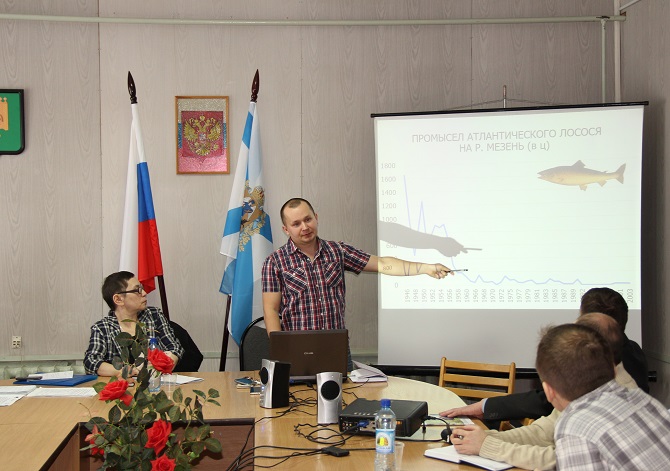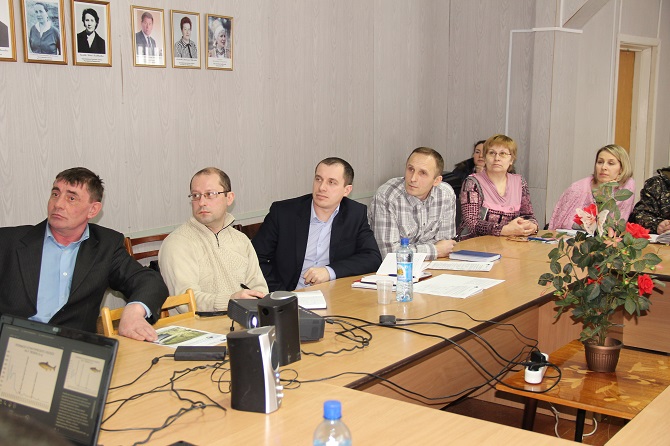Initiative Is Important and It Needs To Be Noticed
Interregional round table “Mezen Fishery Resource Management: Population Involvement” was held in the village of Leshukonskoye, Arkhangelsk region, on 26 February.
The round table facilitated by the Silver Taiga Foundation under its Fish Resource Management in Cooperation with Local Population: Model River Mezen project and Leshukonsky municipality administration gathered around thirty people – representatives of the Leshukonsky district and stakeholders from Udora and Mezen districts.
Following the Conference Recommendations
A number of information sections were presented for the round table participants to discuss. The first one was the project implementation status over the last two years after the same conference held in Leshukonskoye in March 2014; it was described by Valentina Semyashkina, Local Communities Project Manager, with most of the focus on implementing the proposals of the 2014 interregional conference. For instance, two years ago the conference attendees stated that the Mezen fishery resources, mostly the Atlantic salmon being an valuable resource, require comprehensive study, moreover the research is also necessary to determine the impact of various factors, including large-scale logging operations, on the fish stock. Loads of work has been done with regard to this area of focus – the Atlantic salmon monitoring experience exchange seminar, annual trips to spawning streams to assess the spawning quality by means of red counting, censuring young fish migrating downstream with the help of fish counting dams, which was done by SevPINRO experts over the last two years… Moreover, in 2014 the Silver Taiga Foundation started the project targeted at assessment of long-term logging impact on water resources. The long-term residents, who have had a chance to observe the river over a lengthy period are being interviewed, etc. Other 2014 conference recommendations, including development of cooperation between the regions in the vicinity of the Mezen river, were also tackled by specific actions.
Survey Results Raising Argument
Another information section was devoted to the results of the 2014-2015 survey held among Udora, Leshukonsky and Mezen districts. Nikolay Shilov, Silver Taiga’s ecologist, informed the round table participants on the analyzed results of the survey which enabled the locals to assess the Mezen fishery resources and elaborate actions to preserve and restore them.
The activities under the Model River Mezen project raise much interest among residents from the Mezen river districts, as was seen from a multitude of questions by the round table participants and hot discussion of the issues mentioned. In particular, the results of the sociological survey which showed that 66% of the population believe that overfishing is not the main reason for resource depletion, as opposed to ichthyologists, caused a heated debate. For example, people referred to such possible causes as climatic and hydrological changes, like “Have you checked the spawning ground in winter? May they be frozen? Could it be that spawning nests become damaged by breaking ice?” The chairman of the public fishery council of the Mezen district V. Obroskov reminded that “people have always caught fish in the White Sea Throat, they keep on doing it now, but this is not taken into account”, etc. I. Korbut, entrepreneur, suggested that fish population, including the one of salmon, can reduce without any anthropological impact, just like the population of upland foul; according to some studies it sometimes went down even in the areas with no people at all.
However, even though the survey results raised some questions and argument, the participants agreed about one thing – that “there are at least some results available now”, and it is possible to base further work on them.
The audience was also interested in the reports from those experts who participated remotely by skype in the round table – Srgey Tsogoyev, representative of the Center of Specially Protected Natural Areas of the Komi Republic, informed them about possible seasonal limitations to be introduced in specially protected areas in order to protect water biological resources, while Alexander Borovlyov, Silver Taiga GIS-specialist, reported on intermediary results of studies about assessment of long-term logging impact on water courses.
Fishery Perspectives in the Mezen: Questions and Answers
Sergey Ageyev, consultant from the fishery management administration of the Arkhangelsk Region Ministry of Agriculture and Trade, answered the participants’ questions about the current status and development perspectives of the Mezen fishery. Will traditional fishing ever become legalized, or will the legal status still exist for industrial and amateur fishing? Do you consider issuing licenses for fishing on lakes to individuals who do not have a status of a legal entity? Unfortunately, many of such answers do not have an affirmative answer or any answer at all. Nevertheless, the issues keep on being raised – which means it is advisable to try to find the answers.
These questions, as well as some others, are related to the Fishing Rules; therefore it was impossible to ignore such issues at the round table. Are the local population’s interests taken into account? Can the locals influence the provisions of the Fishing Rules?
According to S.Ageyev, even though many people seem dissatisfied with the new Fishing Rules, there are few proposals provided by the citizens – less than twenty last year. Some of them, by the way, have been taken into account and adopted as part of the Rules – the restrictions regarding stone eel catching in the Mezen and Onega were lifted, reporting for industrial fishing organizations was reduced, etc.
The participants of the discussion agreed that the bottom-up initiative is very important in such issues, the more so as the Rules fail to adapt to the regional peculiarities unfortunately. This topic was mentioned by N. Sitnikov, deputy head of the Leshukonsky district administration, A. Vaneyeva, head of the Udora representative office of the Komi Voytyr public movement, and others.
For instance, the public fishery council of the Mezen district initiated the agreement with the Nenets Autonomous area to “allow the access to Mezen fishers to the Kanin peninsula”. However, V. Obroskov thinks that “even though initiative is important, what is more important is it needs to be noticed”. That is what still difficult to be done, as the chairman of the public council believes. As for Leshukonsky district, N. Sitnikov stressed that “no one ever raised these issues in public before”, he promised to focus one of the meetings with heads of settlements held at least six times a year on this topic.
The round table participants approved of the activities under the Model River Mezen project, they underlined the value of raising awareness, especially among youth and children, once again and agreed that such discussion grounds are required, as they make it possible to look for a solution together and highlight the concerns of the local population from the villages and settlements of the Mezen river districts.





